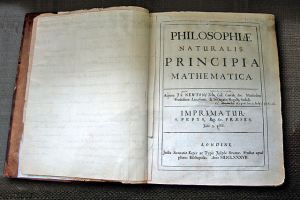Theoretically

Newton’s own copy of Principia with his hand-written corrections
Talking to people can be hard work. I have learned that I shouldn’t use jargon or buzz-words the other person does not understand in the same way I do. But there is a word in science that is hard to avoid using: theory.
In every-day speech, a theory is an idea or a notion; something speculative or something that should happen but may not. It is roughly what scientists call a hypothesis. In science, a theory is “an explanation or model based on observation, experimentation, and reasoning, especially one that has been tested and confirmed as a general principle helping to explain and predict natural phenomena.”
A scientific theory is closer to what we, in our every-day speech, call a fact. Here’s a word that means about the same thing in science. As Stephen Jay Gould says, “In science, ‘fact’ can only mean ‘confirmed to such a degree that it would be perverse to withhold provisional assent.’”
I can’t substitute the word “law”. In science, a law is a description without explanation, usually written as a mathematical equation: Newton’s Law of Universal Gravitation states F=Gm1m2/d2 . Besides, the word “law” already has an everyday meaning as a legal requirement.
There seems to be no simple popular word that means what “theory” means to science. I think most writers of popular science resort to defining “theory” for their readers. But when I hear a well-established scientific explanation dismissed by someone as “only a theory”, I know that tactic doesn’t work very well.
Does anyone have a good word or short phrase to suggest?











